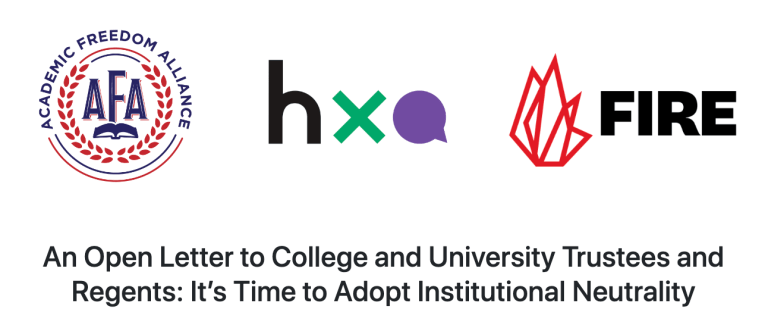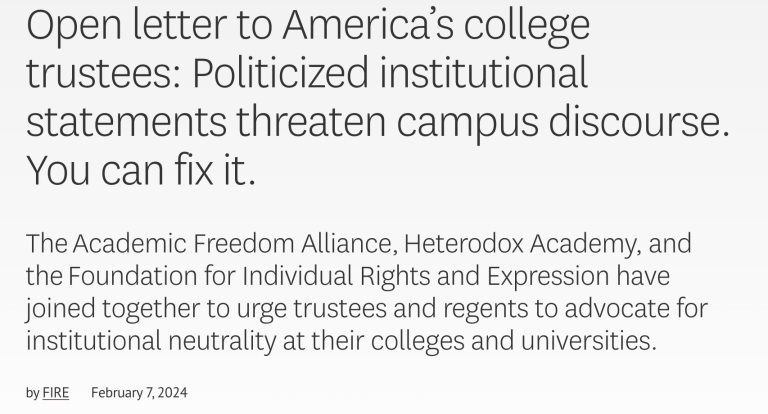The University of Chicago is well known for adopting the principle of “institutional neutrality”—the dictum that our university should take no official position on ideological, political, or moral matters except in the rare situation that such matters directly affect the workings of the school. This principle is embodied in our “Kalven Report.” We see this as a way to avoid chilling the speech of people who fear professional punishment for speaking out against what they see as “official positions.” We also regard this as an important part of our Freedom of Expression policy, which includes not only Kalven but the “Chicago Principles” that guarantee free speech itself.
Although over 100 schools have adopted the Chicago Principles, the number adopting institutional neutrality—the Kalven Principle—remains stuck at just three: the University of Chicago, The University of North Carolina at Chapel Hill, and Vanderbilt University. Another school—Columbia University—may be about to adopt a Kalven-ish stand, but still, that’s only four schools out of about 4,000 degree-granting institutions in America.
Why the difference between the willingness of schools to adopt free speech but not institutional neutrality? It has to be that schools feel that they must weigh in on issues of the day—that if they don’t, and an issue is seen as important and calling for a “right” response, they’ll be seen as bad actors if they keep their yap shut instead of affirming that they’re on the right side of history. This view is shortsighted (“right” views, of course, change over time) and also inimical to freedom of speech.
At any rate, three important organizations, the Academic Freedom Alliance (AFA), the Heterodox Academy (HA), and the Foundation for Individual Rights and Expression (FIRE) have now joined to endorse institutional neutrality. They’ve produced a short open letter about the issue, which you can read by clicking on the headline below:
The gist of the open letter, which is longer:
It is time for those entrusted with ultimate oversight authority for your institutions to restore truth-seeking as the primary mission of higher education by adopting a policy of institutional neutrality on social and political issues that do not concern core academic matters or institutional operations.
In recent years, colleges and universities have increasingly weighed in on social and political issues. This has led our institutions of higher education to become politicized and has created an untenable situation whereby they are expected to weigh in on all social and political issues.
Most critically, these stances risk establishing an orthodox view on campus, threatening the pursuit of knowledge for which higher education exists.
As the University of Chicago’s famous Kalven Report of 1967 states, a policy of institutional neutrality is premised on the defining mission of the university: to pursue truth through “the discovery, improvement, and dissemination of knowledge.” And to accomplish this mission, “a university must sustain an extraordinary environment of freedom of inquiry and maintain an independence from political fashions, passions, and pressures.”
Furthermore, the report recognizes, “There is no mechanism by which [the university] can reach a collective position without inhibiting that full freedom of dissent on which it thrives.” In short, individual faculty members and students are the “instrument of dissent and criticism.” The university, on the other hand, “is the home and sponsor of critics.”
Where to draw the line between institutional neutrality and position-taking is a matter of careful prudential judgment. But, as the Kalven Report notes, there should be “a heavy presumption against the university taking collective action or expressing opinions on the political and social issues of the day.” Smart observers will recognize good faith efforts to apply this principle.
Agreed. Nobody says that Kalven is perfect, but it’s a damn sight better than having no policy so that that universities or departments can issue official endorsements or condemnations of political and ideological views. That is precisely what got the Presidents of Harvard, MIT, and Penn in trouble when they testified before a House committee: on some issues there were official departmental statements, while on others there were not. It was largely this inconsistency that led to the fracas around their Presidents’ testimony in Congress—and to the resignation of Penn President Liz Magill. The University of Chicago wouldn’t even be considered for such an inquiry.
To me, the unity of these organization on the Kalven issue means that colleges have to have a good reason for NOT adopting institutional neutrality. I’m hoping that my constant harping on this issue may inspire some administrators or faculty to get neutrality considered by their schools.
FIRE also issued a press release (click below) with quotes from the leaders of all three organizations.
Here are statements endorsing neutrality from the heads of HA, FIRE, and AFA:
“A top-down, father-knows-best mentality is absolutely no way to support the next generation of free thinkers. Students and faculty deserve the freedom to experiment with different perspectives and explore entirely new ways of thinking without the college claiming to have done all the thinking for them.”
— Greg Lukianoff, FIRE President and CEO
“American colleges and universities need to keep the pursuit of knowledge their principal mission. A public pledge by the overseers of colleges and universities that their schools will take no stance on the controversies of the day will also go a long way to restoring public confidence in the integrity of higher education.”
— Lucas Morel, Chair of the Academic Committee of the AFA
“Colleges and universities should be extraordinary places for the pursuit of knowledge. By adopting neutrality, university leaders empower students and professors to debate tough questions for themselves, allowing them to express heterodox opinions and consider unsettling data, without fear of being silenced or punished.”
— John Tomasi, President of Heterodox Academy
About this issue I’ll just say one more thing: “If not now, when?”



Pretty clear. Great job in keeping this ball in the air, Jerry. Time for boards to get on-board or if not, explain why not.
Exactly right.
Two of the statements refer to the university’s function as “the pursuit of knowledge”. It will be pointed out, particularly in Canada, that the phrase itself has a Eurocentric tinge. Better to use the plural, such as “pursuitS of knowledgeS”. Or, better yet, to direct universities toward the pursuit of the Two Row Wampum Belt principles.
Good one. But it’s true that in Canada, the universities have all committed to indigenizing and decolonizing as was put to them by the Truth and Reconciliation Commission. They will now regard official pronouncements on parochial aboriginal political disputes with Canada as central to their core missions and will pontificate away to their heart’s content, cracking the whip against those who aren’t with the program. This is, in essence, why Mount Royal University fired tenured professor Frances Widdowson: she had failed to indigenize her opinions.
Mazel Tov!
Keep going. Administrators may not even realize that it’s in their own interest to adopt Kalven. No administrator really wants to be on the hook to make public pronouncements on the matters of the day whenever pressured to do so by internal special interest groups. Kalven gives them the license to remain silent and allow the students, faculty, and staff to engage in debate that is unencumbered by the coercive impact that an institutional policy statement entails. And Kalven needs to apply to all levels of the institutional structure, from the president, to the provost, to the deans, and to the department heads.
Glad to see that this is getting traction.
I like that quote from Greg Lukianoff “A top-down, father-knows-best mentality is absolutely no way to support the next generation of free thinkers.” – because that father-knows-best mentality (patronising) is exactly what it feels like at my university (Imperial College).
I don’t believe any colleges will be swayed by these recommendations. They see groups like FIRE and Heterodox Academy as the enemy.